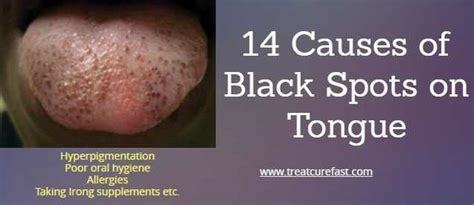Dark Spots On Tongue

The appearance of dark spots on the tongue can be a cause for concern for many individuals. These spots can vary in size, shape, and color, and may be accompanied by other symptoms such as pain, swelling, or changes in taste. In some cases, dark spots on the tongue may be a harmless condition, while in other cases, they can be a sign of an underlying health issue that requires medical attention.
One of the most common causes of dark spots on the tongue is a condition known as hyperpigmentation. This occurs when there is an excess production of melanin, the pigment responsible for skin and hair color, in the tongue. Hyperpigmentation can be caused by a variety of factors, including genetic predisposition, exposure to certain medications or substances, and inflammatory conditions such as lichen planus.
Another possible cause of dark spots on the tongue is a fungal infection. Fungi such as candida can cause white or black patches to form on the tongue, which can be accompanied by other symptoms such as redness, swelling, and difficulty speaking. Fungal infections can be treated with antifungal medications, but it is essential to seek medical attention if symptoms persist or worsen over time.
In some cases, dark spots on the tongue can be a sign of a more serious underlying condition. For example, oral cancer can cause dark spots or patches to form on the tongue, which can be accompanied by other symptoms such as pain, bleeding, and difficulty swallowing. If you notice any unusual changes in your tongue or mouth, it is crucial to seek medical attention immediately.
Hairy black tongue is another condition that can cause dark spots on the tongue. This condition is characterized by an overgrowth of papillae, the small bumps on the surface of the tongue, which can give the tongue a hairy appearance. Hairy black tongue can be caused by a variety of factors, including poor oral hygiene, smoking, and certain medications.
In addition to these conditions, there are several other possible causes of dark spots on the tongue. These include:
- Oral lichen planus: a chronic inflammatory condition that can cause white or black patches to form on the tongue
- Tongue piercing: can cause inflammation and scarring, leading to dark spots on the tongue
- Vitamin deficiencies: deficiencies in vitamins such as B12 or iron can cause changes in the color and texture of the tongue
- Hormonal changes: hormonal fluctuations during pregnancy or menopause can cause changes in the tongue, including dark spots
Diagnosis and Treatment
If you notice dark spots on your tongue, it’s essential to seek medical attention to determine the underlying cause. Your doctor or dentist will perform a physical examination and take a complete medical history to determine the cause of the dark spots. In some cases, additional tests such as a biopsy or imaging studies may be necessary to rule out any underlying conditions.
Treatment for dark spots on the tongue will depend on the underlying cause. In some cases, simple measures such as improving oral hygiene, avoiding irritants, and using antifungal medications may be sufficient to treat the condition. In other cases, more extensive treatment such as surgery or radiation therapy may be necessary to treat underlying conditions such as oral cancer.
Prevention
While it’s not always possible to prevent dark spots on the tongue, there are several steps you can take to reduce your risk. These include:
- Practicing good oral hygiene: brush and floss your teeth regularly to reduce your risk of oral infections and inflammation
- Avoiding irritants: avoid exposure to substances such as tobacco, alcohol, and spicy foods, which can irritate the tongue and cause dark spots
- Eating a balanced diet: eat a diet rich in fruits, vegetables, and whole grains to reduce your risk of vitamin deficiencies and other nutritional disorders
- Avoiding piercings: avoid getting piercings on the tongue, which can cause inflammation and scarring
Conclusion
Dark spots on the tongue can be a cause for concern, but in most cases, they are not a sign of a serious underlying condition. By practicing good oral hygiene, avoiding irritants, and eating a balanced diet, you can reduce your risk of dark spots on the tongue. If you notice any unusual changes in your tongue or mouth, it’s essential to seek medical attention to rule out any underlying conditions that may require medical attention.
What causes dark spots on the tongue?
+Dark spots on the tongue can be caused by a variety of factors, including hyperpigmentation, fungal infections, oral cancer, and hormonal changes.
How can I treat dark spots on my tongue?
+Treatment for dark spots on the tongue will depend on the underlying cause. In some cases, simple measures such as improving oral hygiene, avoiding irritants, and using antifungal medications may be sufficient. In other cases, more extensive treatment such as surgery or radiation therapy may be necessary.
Can I prevent dark spots on my tongue?
+Yes, there are several steps you can take to reduce your risk of dark spots on the tongue, including practicing good oral hygiene, avoiding irritants, eating a balanced diet, and avoiding piercings.